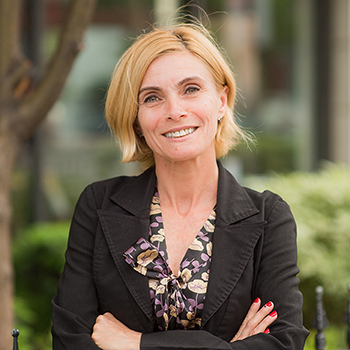Interview with Paula Alves, Manager of Legal Operations at the Barbra Schlifer Clinic

Q: By definition, the humanitarian worker provides material and logistic support to people with the objective of saving lives, alleviating suffering and maintaining human dignity. Do you consider yourself a humanitarian worker?
Paula: Yes, I do. At the Clinic, staff work daily to improve women’s welfare regardless of their location. Our main goal is to ensure the physical, emotional and spiritual safety of our clients. We hope that our efforts contribute to women living free from violence and that their Human rights and dignity are preserved at all times. We also strive to make a change at the systemic level by intervening in issues that influence and affect the population we serve.
Q: What about your role makes you most proud to be a humanitarian?
Paula: I have been the Legal intake worker for the Clinic for 14 years. In this position, I have had the privilege to work with the most vulnerable communities. Women called me at the most critical times in their lives and trusted me with their most private information that, at times, they were speaking out for the first time. I am proud that I earned their trust, that I was respectful of their needs and was able to recognize the intersectional nature of their problems, but also of who they are as people.
I am also proud to be the Project Coordinator and founder of the Criminalization of Women Project that provides legal advice to women who are victims of violence but were themselves charged with a criminal offence. The Schlifer Clinic is conducting research on the connection between the mandatory charging regulation and the criminalization of women victims of violence that will be compiled and circulated to the wider community.
As a Project Coordinator, I am happy about the partnerships we have created with other Agencies in the VAW sector. Some of those were formed at the Forum we organized last Fall to discuss mandatory charging, the Immigration law system, law reform in sexual assault and other issues that impact and lead to the criminalization of women. This forum was attended by eleven different Agencies across Canada.
Last but not least, I am proud to manage an amazing legal team that share and practice the same values and commitment as myself.
Q: Humanitarian efforts tend to support a particular cause. What is the cause you support by working at the Clinic?
Paula: To fight against gender-based violence, to empower women to stand up for themselves and to open a pathway to resources that will make them live free from violence and have their basic needs and Human Rights met. It is also the Schlifer Clinic’s mission to make society and Government accountable for the rights and freedoms of women, who should, as human beings be able to live dignified lives regardless of race, religion, sexual orientation, education, etc.
Q: Given your experience and knowledge, what change is needed (governmental, socio-economic, community etc.) to prevent gender-based violence?
Paula: We need to works towards abolishing a Society where men hold all the power and women are mostly resigned to the periphery. We need to get structures in place that support women in different ways so that if they find themselves in a violent situation, they feel they can leave or ask for help. We need to increase affordable housing, create more subsidized childcare options, provide them with education, job opportunities and make sure they are paid fair wages so that they can financially support themselves and their children. We need to increase counselling services. The legal system has to be reformed to streamline and simplify processes so that women can get Immigration status, custody of their children, protection orders in a more effective and trauma-informed way.
Q: Working at the Clinic can expose you to extraordinary situations that involve women and their experience with violence, in which trauma is common. How do you manage your susceptibility and exposure to vicarious trauma?
Paula: Over the years I have put some practices in place that help me cope with really unfair and heartbreaking stories that I hear daily: I debrief with my co-workers and Director, I have a sound support system of family and friends, and I do yoga. However, I will always be susceptible to these stories, and I do not think this is necessarily a bad thing because, as human beings, we should always be moved and responsive to people’s suffering.
Q: Do you have a story from your practice that stands out for you or reminds you why you wanted to be involved in this line of work?
Paula: Every time a woman smiles because she has her Immigration application accepted, got full custody of her children, received compensation from the criminal injuries compensation board or tell me that she felt respected, heard and safe I am reminded of why I do what I do, and there is nothing else I’d rather be doing.
